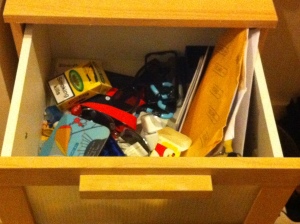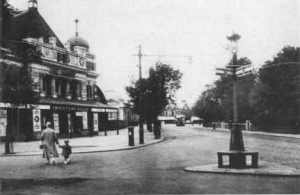‘Have you looked in the kitchen drawer?’ he shouted over the sound of his electric razor.
Holly swore as she paced down the hallway, frantically patting down the pockets of her coat for the sixth or seventh time. She would be late for the staff meeting.
She pulled open the drawer and stared hopelessly into the heaped mess. The Drawer of Lost Things they called it; a home for the misplaced. Holly had always been meaning to clean it out but, with the wedding and the baby, other things had just gotten in the way.
Slapping the yellow manuscript of Love’s Labour’s Won onto the top of the cabinet, she sighed and began to rummage through the chaos. She scrabbled around in the drawer, pushing aside two loose AA batteries and Buzz Aldrin’s Omega watch. She lifted up the cassette featuring the missing 18 minutes from Watergate. There was no sign of her keys.
Florence started crying in the room upstairs. Holly swore as The Great Mongul Diamond rolled past her hand.
‘David,’ she called out irritably, ‘Can you see to her? I’m late for school.’
Holly was stretching now, her shoulder pushed hard against the kitchen cabinet as she fumbled around in the back of the drawer. Her outstretched fingers touched the gilded metal of the Ark of the Covenant and then, as she clawed further into the void, a smooth square of paper.
Curiosity got the better of her and she stepped away from the kitchen counter.
It was a Polaroid, a photo of Holly taken just after university. She was standing outside the offices of a national newspaper with a young, aspirational grin, her arm draped across the shoulders of a friend she no longer remembered the name of.
She smiled sadly at the women, two girls she no longer recognised. Placing the photo back into the drawer with the other lost things, Holly silently walked into the living room to check for her keys down the back of the sofa.
Words: 330







